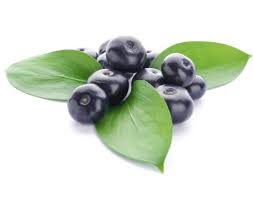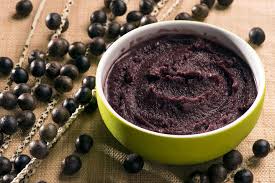Açaí Delight: Exploring the Health Benefits of this Superfood

The Açaí Berry: A Superfood Powerhouse
Originating from the Amazon rainforest, the açaí berry has gained worldwide popularity for its numerous health benefits and delicious taste. This small, dark purple fruit is packed with antioxidants, fiber, and essential nutrients that make it a superfood powerhouse.
One of the key benefits of açaí is its high antioxidant content, which helps to combat oxidative stress and reduce inflammation in the body. These antioxidants can help protect cells from damage and lower the risk of chronic diseases such as heart disease and cancer.
In addition to antioxidants, açaí is also rich in fiber, which can aid in digestion and promote gut health. The fiber content of açaí helps to keep you feeling full and satisfied, making it a great addition to a healthy diet.
Furthermore, açaí is loaded with essential nutrients such as vitamins A, C, and E, as well as minerals like potassium and calcium. These nutrients play a crucial role in supporting overall health and well-being.
Whether enjoyed in smoothie bowls, juices, or supplements, incorporating açaí into your diet can provide a tasty way to boost your health. So next time you’re looking for a nutritious snack or meal option, consider reaching for the powerful and delicious açaí berry!
8 Reasons to Love Açaí: From Antioxidant Power to Delicious Convenience
- High in antioxidants that help combat oxidative stress
- Rich source of fiber for improved digestion and gut health
- Packed with essential nutrients like vitamins A, C, and E
- Contains minerals such as potassium and calcium for overall health
- May help reduce inflammation in the body
- Can aid in weight management due to its fiber content keeping you full longer
- Delicious taste makes it a popular addition to smoothie bowls and juices
- Convenient option for a quick and nutritious snack or meal
Consider These Drawbacks of Açaí: High Calories, Cost, Environmental Concerns, and Added Sugars
High in antioxidants that help combat oxidative stress
Açaí berries are renowned for their high antioxidant content, making them a valuable ally in combating oxidative stress. These powerful antioxidants work to protect our cells from damage caused by free radicals, reducing inflammation and promoting overall health. By incorporating açaí into your diet, you can harness the benefits of these antioxidants to support your body’s natural defense mechanisms and enhance your well-being.
Rich source of fiber for improved digestion and gut health
Açaí berries are a rich source of fiber, making them a valuable addition to a healthy diet for improved digestion and gut health. The high fiber content in açaí helps to promote regular bowel movements, prevent constipation, and support a healthy digestive system. By incorporating açaí into your diet, you can enjoy the benefits of increased fiber intake, which can aid in maintaining optimal gut health and overall well-being.
Packed with essential nutrients like vitamins A, C, and E
Açaí is a nutritional powerhouse, packed with essential nutrients such as vitamins A, C, and E. These vitamins play a crucial role in supporting overall health and well-being. Vitamin A is essential for maintaining healthy vision and a strong immune system. Vitamin C is known for its antioxidant properties and its ability to boost the immune system. Vitamin E is a powerful antioxidant that helps protect cells from damage caused by free radicals. Incorporating açaí into your diet can be a delicious way to ensure you’re getting these important vitamins to support your health.
Contains minerals such as potassium and calcium for overall health
Açaí is a beneficial superfood that contains essential minerals like potassium and calcium, which are vital for maintaining overall health. Potassium plays a key role in regulating blood pressure, muscle function, and electrolyte balance, while calcium is crucial for strong bones and teeth. By incorporating açaí into your diet, you can easily boost your intake of these important minerals and support your body’s optimal functioning.
May help reduce inflammation in the body
Açaí berries are known for their potential to help reduce inflammation in the body. Packed with antioxidants, these superfood berries can combat oxidative stress and inflammation, which are linked to various chronic diseases. By incorporating açaí into your diet, you may be able to support your body’s natural defense mechanisms and promote overall well-being.
Can aid in weight management due to its fiber content keeping you full longer
Açaí’s high fiber content can be a valuable asset in weight management efforts by promoting a feeling of fullness that lasts longer. This means that incorporating açaí into your diet can help curb cravings and prevent overeating, ultimately supporting your weight loss or maintenance goals. By keeping you satisfied for longer periods, açaí can contribute to a balanced and controlled approach to managing your caloric intake, making it a beneficial addition to a healthy eating plan.
Delicious taste makes it a popular addition to smoothie bowls and juices
The delicious taste of açaí makes it a highly sought-after ingredient for smoothie bowls and juices. Its rich, slightly sweet flavor adds a unique and satisfying element to these popular dishes, enhancing both the taste and nutritional value. Açaí’s versatility allows it to be easily incorporated into various recipes, making it a favorite choice for those looking to enjoy a flavorful and nutritious treat.
Convenient option for a quick and nutritious snack or meal
Açaí is a convenient option for a quick and nutritious snack or meal, making it ideal for busy individuals looking to maintain a healthy diet on-the-go. Whether enjoyed as a smoothie bowl, blended into a refreshing juice, or added to yogurt or granola, açaí provides a delicious and satisfying way to fuel your body with essential nutrients in a convenient and time-efficient manner. Its versatility and ease of preparation make it an excellent choice for those seeking a convenient yet nutritious option to support their overall well-being.
High in calories
A notable downside of açaí is its high calorie content, particularly in popular forms like açaí bowls and drinks. While açaí is packed with nutrients and antioxidants, the caloric density of these products can be a concern for individuals who are mindful of their caloric intake. Consuming açaí bowls or drinks regularly without considering portion sizes and overall calorie consumption may lead to unintended weight gain or hinder weight management goals for some individuals. It’s important for those watching their caloric intake to be mindful of the serving sizes and ingredients used when enjoying açaí-based products.
Expensive
A notable downside of açaí is its costliness. Açaí products tend to be more expensive than other fruits and superfoods, which can make it less accessible to certain consumers. The higher price point of açaí can be a barrier for individuals looking to incorporate this superfood into their diet on a regular basis, potentially limiting its reach and availability to a broader audience.
Environmental impact
The growing demand for açaí has raised concerns about sustainability and potential negative effects on the environment. The increased cultivation of açaí palm trees to meet market demands can lead to deforestation, habitat destruction, and loss of biodiversity in the Amazon rainforest where the berries are predominantly grown. Additionally, intensive farming practices and use of pesticides can harm the ecosystem and threaten the delicate balance of the environment. It is important for consumers and producers to prioritize sustainable farming methods and conservation efforts to mitigate the environmental impact of açaí production.
Potential added sugars
Some commercially available açaí products may contain added sugars or sweeteners, which can detract from its natural health benefits. While açaí itself is a nutritious superfood, the presence of added sugars in certain products can compromise its health benefits by increasing calorie and sugar intake. It is important for consumers to be mindful of reading labels and choosing açaí products that are free from unnecessary additives to fully reap the nutritional advantages that this superfruit has to offer.

